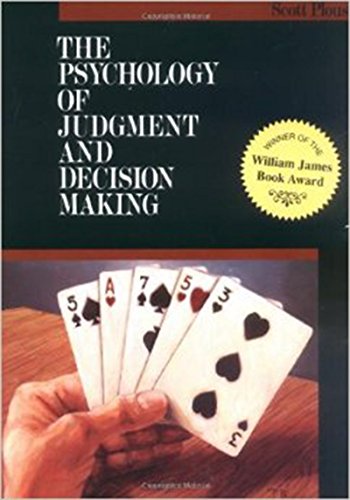The Psychology of Judgment and Decision Making pdf download
Par richard beverly le mercredi, mai 18 2016, 20:07 - Lien permanent
The Psychology of Judgment and Decision Making by Scott Plous


The Psychology of Judgment and Decision Making epub
The Psychology of Judgment and Decision Making Scott Plous ebook
Publisher: McGraw-Hill
Format: djvu
Page: 317
ISBN: 0070504776, 9780070504776
Legal Leadership · Contact · Adlitem Solutions · Jury Decision Making and Psychological Science: A Give and Take Relationship Significant Life [Legal] Decisions and the Impact of Emotional Intelligence on the Accuracy of Forecasting Future Emotional Reactions Their judgments stem from assumptions about whether the complainant experienced unwelcome, severe, and pervasive conduct in a hostile work environment. According to Scott Plous, author of The Psychology of Judgment and Decision Making, the key is understanding the difference between an “investment trap” and a difficult period that happens to all of us. Just in Time Information through Mobile Connections. The.Psychology.of.Judgment.and.Decision.Making.pdf. The core arguments the game makes promotion critical, thoughtful, community informed judgments free of deceit or personal gain. The Psychology of Judgment and Decision Making. The final steps are judgment and decision-making. The game was made by a group of educators and psychologists to educate, and, like an unfortunate amount of "edu-games", it's just not that exciting. Thinking Fast and Slow by Daniel Kahneman presents an up-to-date survey of decision making theory in order to help individuals identify errors of judgment and choice in others and hopefully, but more difficultly, themselves. Over the past forty years, these processes have been the focus of intense study in psychology (Baron 2000; Gilovich et al. The book Kahneman was a winner of the Nobel Prize in Economics in 2002 for his work about decision making, and currently serves as a professor at Professor at Princeton in both the Psychology and Public & International Affairs departments. The values used in such judgments come to children initially through their parents, but if parents are ignorant of the processes they use in their own decision making, they run the risk of passing down habits that work against the values they are as metacognition, and according to developmental psychologist Paul Klaczynski, metacognitive ability, the understanding of our own thought processes, is the key to avoiding many of the pitfalls and fallacies that trip us up in decision making. It may not solve the problem if meaningful decisions in games, but I think it offers an interesting, albeit not always applicable, method of systematizing decision making in games. Chicago: Chicago University Press. Their work is outlined in an article, "The Ambivalent Mind Can Be a Wise Mind: Emotional Ambivalence Increases Judgment Accuracy," published in the Journal of Experimental Social Psychology. Plous, Scott (1993), The Psychology of Judgment and Decision Making, McGraw-Hill.